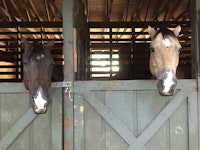
For more than 50 years, Camp Highlander (CH) has offered horseback riding to campers as part of regular daily activities. Throughout the decades, the program has varied in size and features. Today, it boasts 22 well-trained horses cared for by Horseback Riding Program Director Melissa Van Doren and six “Cherubs” – Van Doren’s nickname for her team of assistants. Van Doren also happens to be a Camp Highlander alumna; she attended CH in the 1970s and ’80s as both a camper and staff member.

Shelley and Karl Alexander lead an off-camp trail ride
Horse Culture
The love of horses runs deep at Highlander. Karl and Shelley Alexander, the owners of Camp Highlander, are avid fans of everything equestrian, and own five horses of their own. In 2014, the Alexanders purchased a home in Tryon, North Carolina, and are currently completing their dream barn on the area’s extensive trail system. Because of their long-time involvement with horses, including owning a 70-horse facility outside Baton Rouge, Louisiana, the Alexanders understand the hard work, dedication and expertise it takes to direct the horseback program at Highlander. They met Van Doren at a Camp Highlander reunion in 2011. A casual conversation quickly turned to horses, and soon after they hired her to run the program in 2012.
Decades of Experience
Van Doren began riding when she was five years old and started teaching lessons when she was 15. In her early 20s, she began training horses, and has participated in a variety of competitive and recreational disciplines, including hunters, jumpers, equitation, dressage, trail riding, and hunter pace events. “I’ve owned thoroughbreds, crossbreds, warmbloods and gaited horses,” said Van Doren. “I’ve managed small barns and large barns, been a full-time equestrian professional, and taught lessons on the side of a busy publications career. My students have ranged from four-year-olds taking their very first ride to accomplished adult amateurs showing on the national circuit. I’ve loved every minute of it.”

Van Doren (third from left) and the 2015 Cherubs
The Cherubs

Each summer, Van Doren hires the Cherubs, most of whom have worked with horses for at least several years and understand the dedication it takes to keep each horse happy, healthy and at optimal performance. Van Doren looks for specific criteria. “I look for fellow horse nuts – people who want to be with horses all day long, in all kinds of weather and circumstances, no matter what. Experienced riders who have already done some teaching are a wonderful addition to the program, but I’m also happy to take on positive, enthusiastic, responsible, hard workers who are still learning to ride and who have never taught.” The team arrives at Camp Highlander several weeks before the campers, and Van Doren uses that time to help improve the Cherubs’ skills in the saddle and establish the horse and facility care routine.
Round-The-Clock Care
Working at any barn is a very physically demanding job and the CH barn is no exception. The Cherubs are at work an hour before the wake-up bell rings, and often finish their chores after dark. “We move the horses to and from their pastures, feed and groom them, tack them up and teach five periods of lessons each day,” said Van Doren. “One Cherub teaches grooming, horse behavior and general knowledge at the barn. The other five teach private riding lessons geared to the individual camper’s needs in the arena, walking and jogging alongside the horses to give the campers instant feedback and support when necessary. That’s the fun part, but we also actually enjoy caring for the stalls and equipment, and keeping the barn neat and tidy. It’s an endless cycle, but it gives you a real sense of satisfaction at the end of the day.”

An Enduring Impact
The positive effects of horses go well beyond a leisurely ride around the ring. Van Doren explains, “Horses teach us patience and inspire courage and an adventurous spirit. Riding develops physical strength, flexibility and coordination, mental focus, and emotional control.” She continued, “Though we may only see some campers for an hour when they visit the barn with their cabin group, we teach all of them the basics of balance and control that lets them experience the thrill of independently guiding a large, powerful animal. Some campers choose to return to us for more in-depth lessons, or, if their skill level permits, go on- or off-camp trail riding. No matter what their level of participation, every camper takes new knowledge and improved self-confidence away from the barn.”

Van Doren continued, “The best part of my day is seeing the smile that lights up the face of a rider who accomplishes something difficult. It might be their first time riding without assistance, the moment when that elusive posting trot falls into the right rhythm, or improvement in their understanding of how to jump – it’s all wonderful.”

